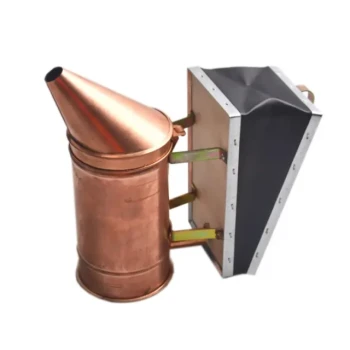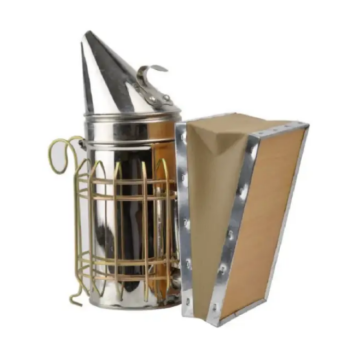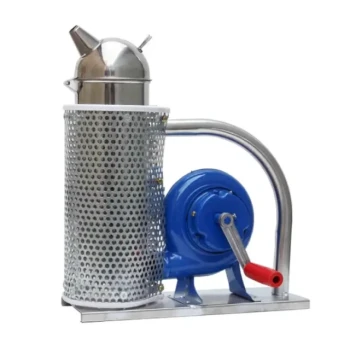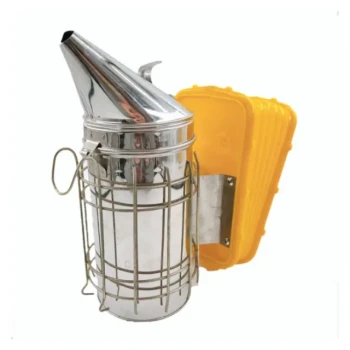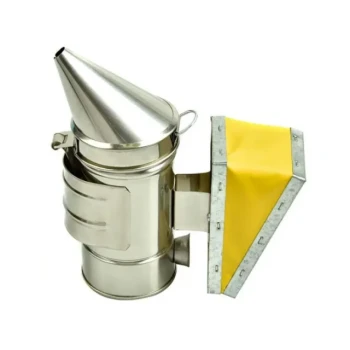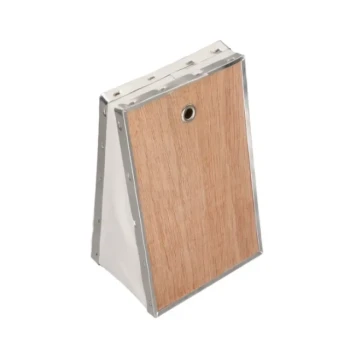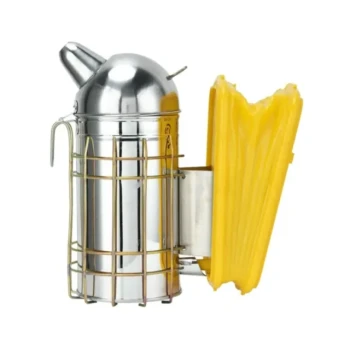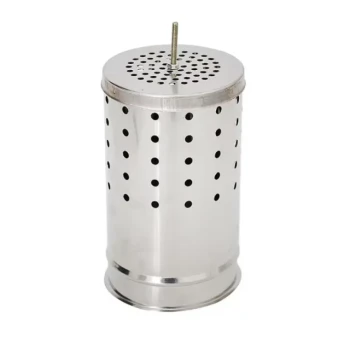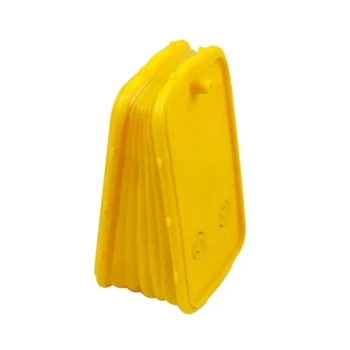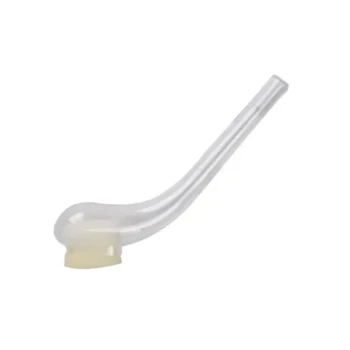When used correctly, a bee smoker is not harmful to bees. Its purpose is to calm the colony by interrupting their primary defense communication, which makes necessary hive inspections safer for both the beekeeper and the bees themselves.
The question isn't whether smoke is "good" or "bad," but how it is used. When applied judiciously with the right fuel, a smoker is an essential tool that reduces stress and defensiveness in a colony; when used improperly, it can cause harm.
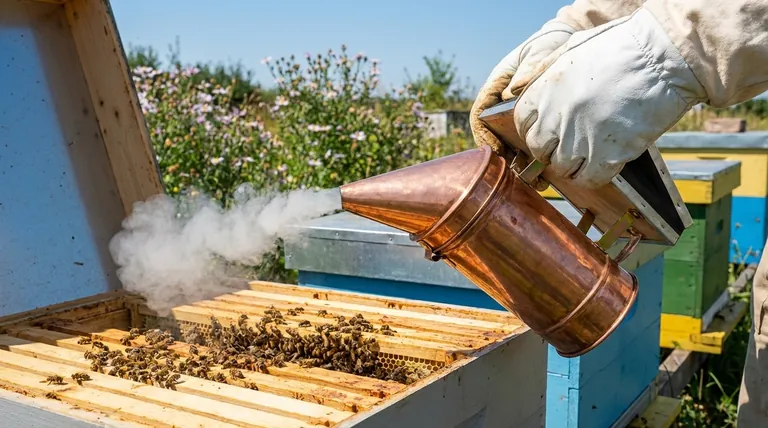
How Smoke Actually Affects Bees
To understand the smoker's role, you must first understand the bee's response. The effect is not one of sedation but of distraction and instinct.
Masking the Alarm Pheromone
When a bee feels threatened or stings, it releases an alarm pheromone (isopentyl acetate). This chemical signal smells like bananas and instantly alerts other guard bees to the threat, triggering a coordinated defensive attack.
Smoke effectively masks this pheromone. It overwhelms the bees' sensitive olfactory receptors, preventing the alarm signal from spreading throughout the hive and stopping a defensive frenzy before it starts.
Triggering a Feeding Response
Smoke also triggers a deeper, evolutionary instinct. The smell of smoke suggests a potential forest fire, signaling to the bees that they may need to abandon their hive.
In preparation, the bees will gorge themselves on honey. A bee with a full stomach is physically less able to flex its abdomen to sting and is generally more docile, focusing on survival rather than defense.
Understanding the Trade-offs and Risks
While a smoker is a critical tool, its effectiveness depends entirely on responsible use. Improper technique or fuel can turn it from a helpful instrument into a harmful one.
The Critical Role of Fuel
The most significant risk comes from what you burn. You must use only safe, clean, and natural fuels.
Good fuels are primarily cellulose-based, such as untreated burlap, pine needles, wood shavings, or cotton fibers. These produce a cool, white smoke. Never use synthetic materials, plastics, or chemically treated wood, as these can release toxins that are harmful to bees and can contaminate the honey.
The Danger of Over-smoking
More is not better. A few gentle puffs at the entrance and under the hive lid are usually sufficient.
Over-smoking can excessively stress the colony, irritate their respiratory systems, and potentially taint the flavor of the honey. It drives bees away from their work and can cause the queen to stop laying.
The Risk of Carelessness
A smoker contains a real fire. It must be handled with extreme care to prevent accidentally igniting the hive, beekeeping equipment, or the surrounding environment, especially in dry conditions.
How to Use a Smoker Responsibly
Your approach to using a smoker should be guided by your primary goal: ensuring the health and safety of your colony.
- If your primary focus is bee health: Use the absolute minimum amount of cool, white smoke from a clean, natural fuel source only when necessary to perform an efficient inspection.
- If your primary focus is beekeeper safety: Apply a few gentle puffs to the entrance before opening the hive and a few across the top frames to keep the guard bees calm and prevent stinging.
- If you are choosing fuel: Always opt for untreated, natural materials and ensure they are completely dry to produce a cool, thick smoke rather than hot flames.
Ultimately, the smoker is a tool for communication, used to gently signal your peaceful intentions to the hive.
Summary Table:
| Factor | Good Practice | Risk of Improper Use |
|---|---|---|
| Fuel Type | Natural, untreated materials (burlap, pine needles) | Toxic fumes from synthetics/treated wood |
| Smoke Amount | A few gentle puffs at the entrance and under the lid | Over-smoking stresses bees, irritates respiratory systems |
| Technique | Cool, white smoke to mask alarm pheromones | Hot smoke or flames can harm bees and risk fire |
| Primary Goal | Calm bees for safe, efficient hive inspections | Can cause colony stress and queen to stop laying |
Ensure Your Apiary's Success with Professional-Grade Equipment
For commercial apiaries and beekeeping equipment distributors, using the right tools is fundamental to the health of your bees and the success of your operation. HONESTBEE supplies durable, reliable beekeeping supplies and equipment through our wholesale-focused operations, helping you manage your hives safely and efficiently.
Let us help you protect your investment.
Contact HONESTBEE today to discuss your wholesale needs and equip your apiary with the best.
Visual Guide
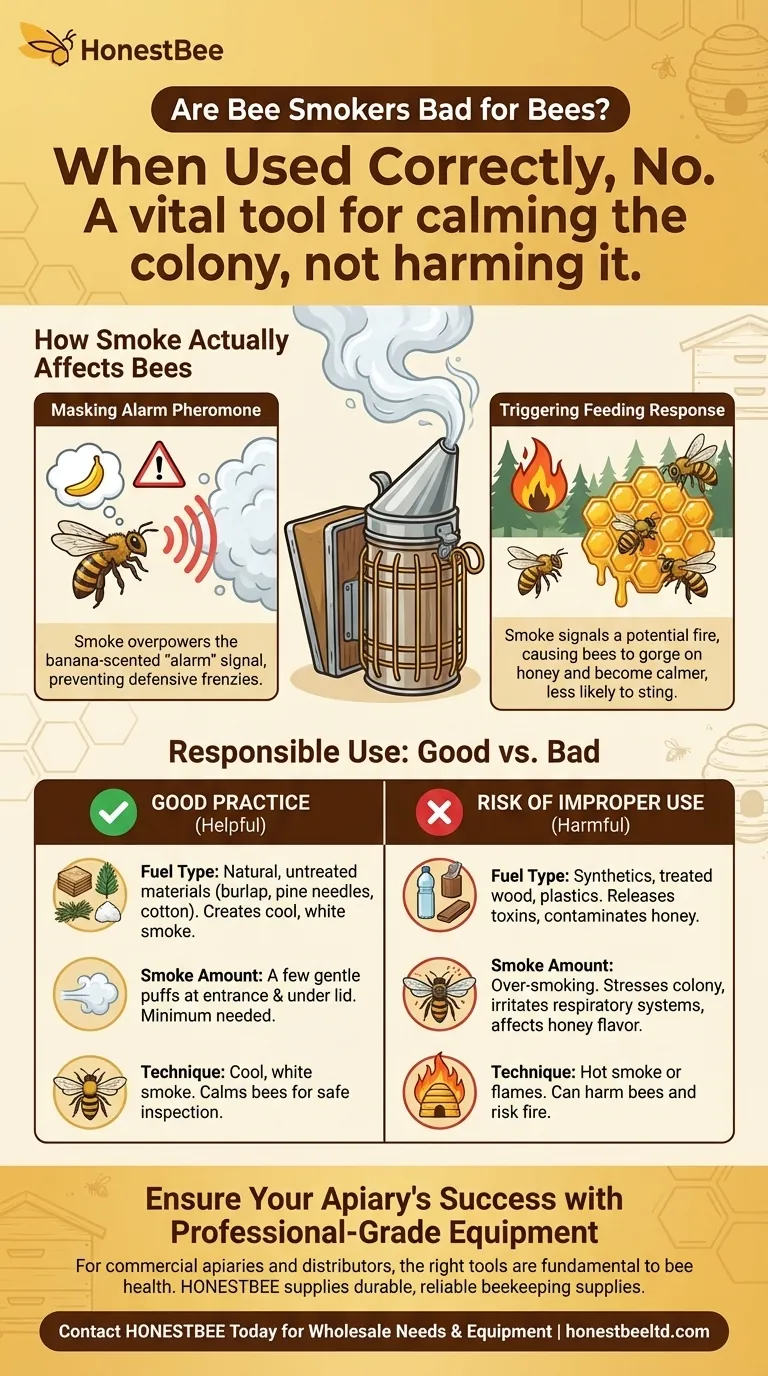
Related Products
- Premium Traditional Copper Bee Smoker with Bellows
- Stainless Steel Honey Bee Smoker Hive and Honeycomb Smoker for Beekeeping
- Stainless Steel Electric Beehive Smoker for Beekeeping and Bee Keeper Use
- European Stainless Steel Bee Smoker for Honey Bee Hive
- Economy Galvanized Beekeeping Honey Bee Smoker for Wholesale
People Also Ask
- Why is an industrial-grade smoker an essential tool? Master Colony Control for Safety and Yield
- What is the primary function of a handheld beekeeping smoker? Optimize Commercial Apiary Hive Management and Safety
- What are the components of a beekeeper's smoker? A Deep Dive into Professional Smoker Anatomy
- Why is it necessary to use a bee smoker with dried tobacco leaves? A Guide to Non-Chemical Wax Moth Control
- What are the components and purpose of a bee smoker? Master the Essential Tool for Safe Apiary Management
- How does smoke from a bee smoker affect honeybees? The Science Behind a Calm Hive
- What is the purpose of the shaded drying process for plant materials used in beekeeping? Maximize Fumigation Potency
- How does a bee smoker improve safety and efficiency during hive management? Master Colony Control with HONESTBEE
